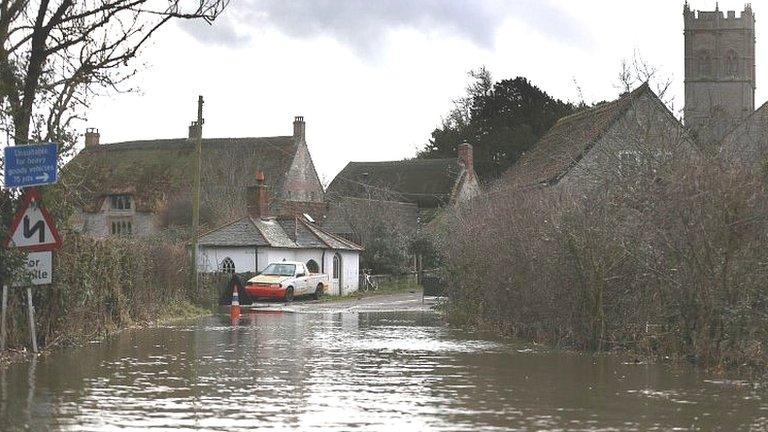Living 'island life' on the Somerset Levels
- Published
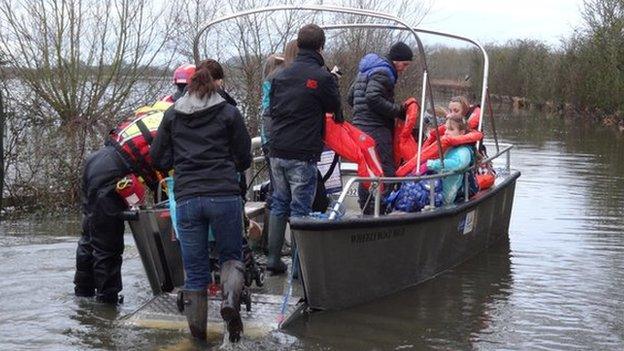
Emily Bradley and her sister, Gemma, on board the boat to school
As military planners discuss what support is needed to help Somerset's flood-hit residents, those in Muchelney have been described as "at breaking point".
The village has been cut off for a month, time has slowed down and everything takes longer, but many residents say they have been coping well.
They have been grappling with island life, as the land that surrounds the stone farmhouses has been inundated with muddy water.
The journey to Muchelney, in a "humanitarian" boat from Langport, is surprisingly peaceful, and on arrival, the shore of "The Island" holds half a dozen residents, waiting to take the return journey.
Any novelty about climbing on board has long worn off and even the children, making their way to school, admit it is now boring.
Emily Bradley, aged 10 and wrapped up in a thick woollen scarf, said "it was exciting, but now it's just really sad".
Up the road stands St Peter and St Paul's Church, where groceries and newspapers have been gathered for collection.
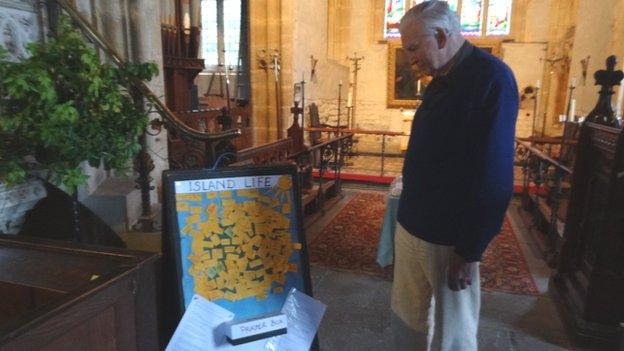
Charles Vaughan-Johnson reads notes highlighting the positive aspects of "Island Life"
Charles Vaughan-Johnson, 79, who lives opposite, has popped in to check on things.
He "just got in before the water rose" on Boxing Day and has not driven out of the village since.
His is the problem of all Muchelney's residents - getting out. Each of the four roads that come into the village is flooded.
"People are beginning to get very frustrated," he said.
It is not just the parish of Muchelney that has been affected. Some residents talk of "forgotten villages" because Muchelney, in a sense, is lucky.
Few homes here have actually been flooded. Instead, they are marooned on raised land.
'Different mental state'
Travelling to nearby Thorney has meant taking a tractor for the last month, though now Wessex 4x4 Response has also stepped in to help.
Driving slowly through the water, Mike Stockholm keeps his Land Rover to the middle of the road and a close eye on markers left by the fire service on nearby telegraph posts.
"We're running for anyone really, just to make life a bit easier for people," he said.
One of Mike's pick-ups is Glen Ward, who has lived in Thorney for 20 years.
Glen's house sits on the edge of the water line. Around it, debris lines the road - branches, grass, mud and a surprising number of rotten apples.
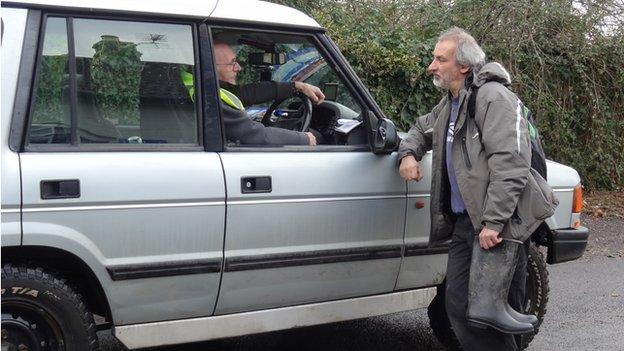
Glen Ward tells Wessex 4x4 Response driver Mike Stockholm "you just do what you have to"
He points out eight houses still engulfed by water.
"Initially, it is scrambling about trying to save your house, and when you can't, then you enter a different mental state," he said.
"Where everyone is on foot and people can't hurry about anymore, you get chatting to people that normally you might just have nodded at.
"And people who haven't been flooded actually feel a bit guilty, but they have been so generous with their offers of help."
Mr Ward does feel a frustration as he said when they first flooded, the Environment Agency did not even realise homes were under water.
He added that when an offer of a temporary toilet came after three weeks, when their own facilities were working again, it was hard to have faith in the authorities.
"I know people mean well, but it's all been too little, too late."
'Roller coaster of emotion'
Arriving back in Thorney, Carolyn Roche helps her three-year-old daughter Lilly out of one of the Wessex vehicles and jokes that she does not know "how I am going to make the trip to pre-school exciting in future", adding that when the 4x4 arrived that morning, Lilly had asked "where is the fire engine?".
Mrs Roche runs a holiday-let business with her husband and they have taken in four families that have had their homes completely flooded.
"It really comes like a roller coaster of emotion - some days you are alright and other days you feel utterly desperate and depressed," she said.
"Life isn't normal. The boat stops at dusk, for safety reasons - as it should - but there are all these normal things that people can't do.
"It does feel like you are under a curfew."
In the other direction lies Muchelney Ham, where retired GP and "hobby farmer" Elizabeth Nightingale's house is under a foot of water.
She said her home had just been "sorted out" following last year's flooding when the water approached again in December.
Inside, the smell of damp is overwhelming, but sat at her large kitchen table, she remains calm as she describes the "devastation" that flooding brings.
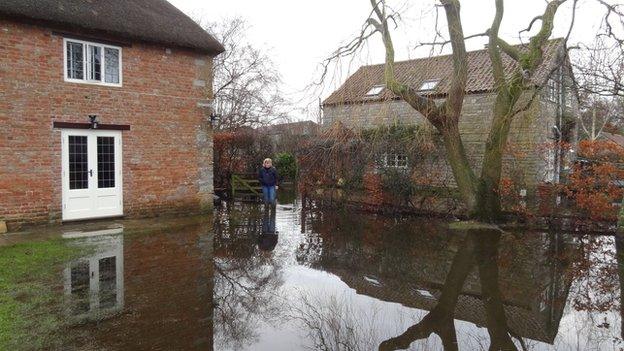
Elizabeth Nightingale's home lies through a muddy field and flood water dirty with farm waste and diesel
"Until last year, I thought you brushed the water out and that was the end of it.
"I had no idea that your house has to be completely stripped out - I don't think people realise the devastation goes on for months."
The area is, as locals know, a flood plain and the Somerset Levels have always flooded.
Mrs Nightingale accepts that fact but says the flood plain should be "managed".
"For those 'proper farmers', who have been here for years and whose livelihoods are at stake, it is absolutely horrendous.
"You can't just leave it to nature."
It has been announced that local rivers will be dredged once water levels subside.
The stranded residents worry that, as with last year, once the water is gone, they will be left alone again.
In Thorney, Mrs Roche said "until we see dredgers on the sides of the rivers, the pressure needs to be kept up", while in Muchelney, Mr Vaughan-Johnson is less sceptical.
"I think it will get attention and something will be done," he said.
"Whether that is enough is still an open question."
- Published30 January 2014
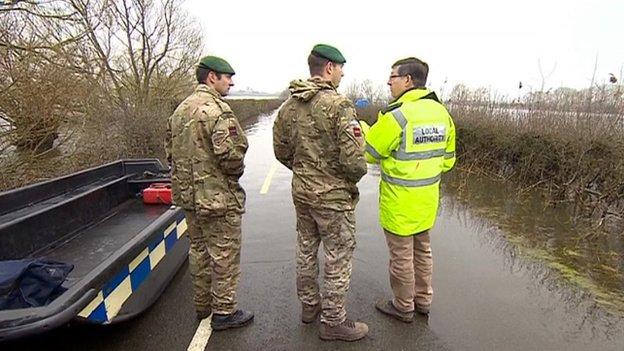
- Published22 February 2022
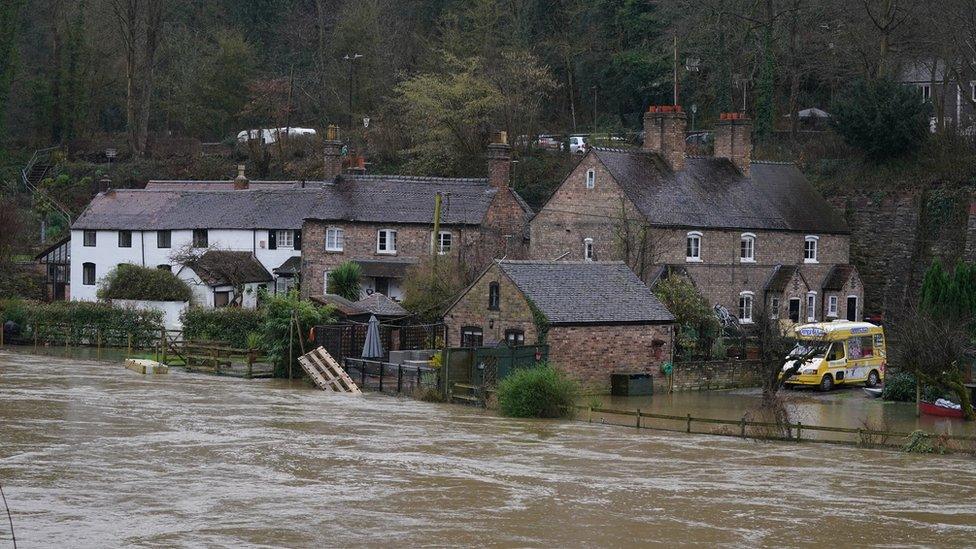
- Published29 January 2014
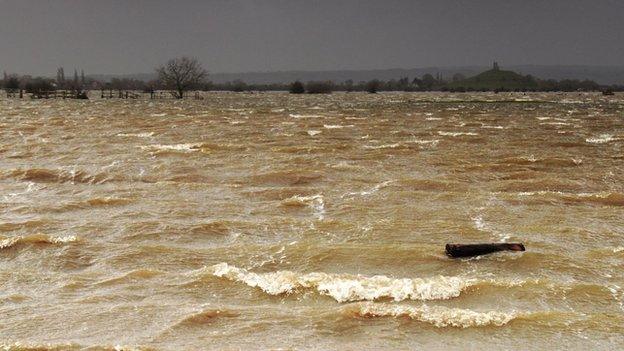
- Published25 January 2014
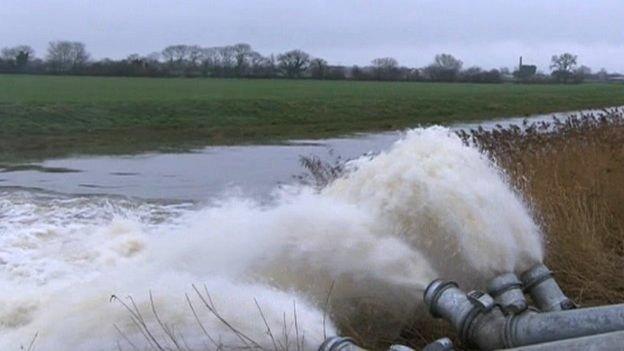
- Published24 January 2014
